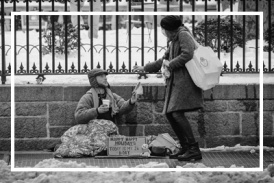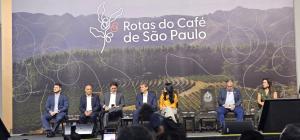The São Paulo government has launched a new development project 'The São Paulo Coffee Routes'

Secretary of Tourism of the State of São Paulo, Dr Roberto de Lucenaand Uiara Zagolin ( advice on international and diplomatic affairs)
The project will bring together producers, cooperatives, industry, and consumers, stimulate the creation of new companies, and strengthen local commerce and services, including the hotel network. With this boost, the plan aims to consolidate São Paulo’s position as a leading tourist and business destination in the coffee sector. The coffee sector contributed R$5 billion to São Paulo's agricultural production (VPA) in 2024. It ranked seventh among the 50 agricultural products with the best economic performance in the state, according to the São Paulo Institute of Agricultural Economics (IEA-Apta). The routes are: Cuesta, Itaqueri and Tietê Paulista Route (which comprise municipalities such as Brotas, Dois Córregos and Dourado); Paulista Waters Circuit Route (Serra Negra, Monte Alegre do Sul, Amparo and Campinas); Paulista Volcanic Mantiqueira Route (Caconde, Espírito Santo do Pinhal and Águas da Prata); Paulista Mogiana Route (Franca, Pedregulho, Patrocínio Paulista and Cristais Paulista) and Alta Paulista Route (Marília and Garça).
Likewise, there are coffee shops such as the Biological Institute, located in the capital; the Berelu farm, located in Cerqueira César; the Sol Nascente farm, in Ibiúna; and the APTA area of Adamantina. Among them are the Piratininga Coffee Museum/Fazenda São João, in Piratininga; the Coffee Museum in Santos; the Casa das Artes Studio and the Campo dos Sonhos Farm Hotel, both in Socorro; and Cabo Querência in Garça. The initiative is a partnership between the State Treasury Department, the Department of Tourism and Travel (Setur), the Department of Economy and Creative Industry (Secult), the Department of Agriculture and Supply (SAA), the Department of Economic Development (SDE), InvestSP, linked to SDE, and the Santos Coffee Museum.
The launch will also mark the opening of the exhibition “Women in Coffee: 1870-1930”, promoted by the Coffee Museum and open until April 23 at Palácio dos Bandeirantes. Namely, the São Paulo Coffee Routes are also connected to the SP Produz Program, of the Department of Economic Development, which recognizes, supports and promotes Local Production Chains (CPLs). There are three recognized CPLs for this coffee segment: Divinolândia, Caconde and Torrinha. Currently, the state has more than 12 thousand professionals employed in cultivation, and around 1.1 thousand in the wholesale trade of coffee beans in the state, according to data from Caged (Jan/2025).
Denny Silva
Life & Fashion Magazine
+1 914-490-6912
email us here
Legal Disclaimer:
EIN Presswire provides this news content "as is" without warranty of any kind. We do not accept any responsibility or liability for the accuracy, content, images, videos, licenses, completeness, legality, or reliability of the information contained in this article. If you have any complaints or copyright issues related to this article, kindly contact the author above.
Audfly Technology Unveils New Alpha Series Modules, Advancing the Future of Directional Sound
Miami Dade Apostille Expands Access to Fast, Secure International Document Certification
PlanckMan - The Retro Game That Never Was Officially Launches on Steam, YouTuber Creates Custom Arcade Machine
Więcej ważnych informacji
 Jedynka Newserii
Jedynka Newserii

 Jedynka Newserii
Jedynka Newserii

Konsument

Grupa nowych biednych emerytów stale się powiększa. Ich świadczenie jest znacznie poniżej minimalnej emerytury
Przybywa osób, które z powodu zbyt krótkiego czasu opłacania składek pobierają emeryturę niższą od minimalnej. Tak zwanych nowych biednych emerytów jest w Polsce ok. 430 tys., a zdecydowaną większość grupy stanowią kobiety – wskazują badania ekspertów Instytutu Pracy i Spraw Socjalnych. W ich przypadku krótszy okres składkowy zwykle wynika z konieczności opieki nad dziećmi lub innymi osobami w rodzinie. Wśród innych powodów, wymienianych zarówno przez panie, jak i panów, są także praca za granicą lub na czarno oraz zły stan zdrowia.
Media i PR
M. Wawrykiewicz (PO): Postępowanie z art. 7 przeciw Węgrom pokazało iluzoryczność tej sankcji. Unia wywiera naciski poprzez negocjacje nowego budżetu

Przykład Węgier pokazał, że procedura z artykułu 7 traktatu o UE o łamanie praworządności nie ma mocy prawnej z powodu braku większości, nie mówiąc o jednomyślności wśród pozostałych państw członkowskich. Negocjacje nowego budżetu UE to dobry pretekst do zmiany sposobu części finansowania z pominięciem rządu centralnego. Czerwcowy marsz Pride w Budapeszcie pokazał, że część społeczeństwa, głównie stolica, jest przeciwna rządom Viktora Orbána, ale i na prowincji świadomość konsekwencji działań Fideszu staje się coraz większa przed przyszłorocznymi wyborami.
Firma
Blockchain zmienia rynek pracy i edukacji. Poszukiwane są osoby posiadające wiedzę z różnych dziedzin

Zapotrzebowanie na specjalistów od technologii blockchain dynamicznie rośnie – nie tylko w obszarze IT, ale również w administracji, finansach czy logistyce. Coraz więcej uczelni wprowadza programy związane z rozproszonymi rejestrami, które wyposażają studentów w umiejętności odpowiadające wymogom rynku.
Partner serwisu
Szkolenia

Akademia Newserii
Akademia Newserii to projekt, w ramach którego najlepsi polscy dziennikarze biznesowi, giełdowi oraz lifestylowi, a także szkoleniowcy z wieloletnim doświadczeniem dzielą się swoją wiedzą nt. pracy z mediami.



![Nestlé w Polsce podsumowuje wpływ na krajową gospodarkę. Firma wygenerowała 0,6 proc. polskiego PKB [DEPESZA]](https://www.newseria.pl/files/1097841585/fabryka-nesquik_1,w_85,r_png,_small.png)






.gif)

 |
| |
| |
|